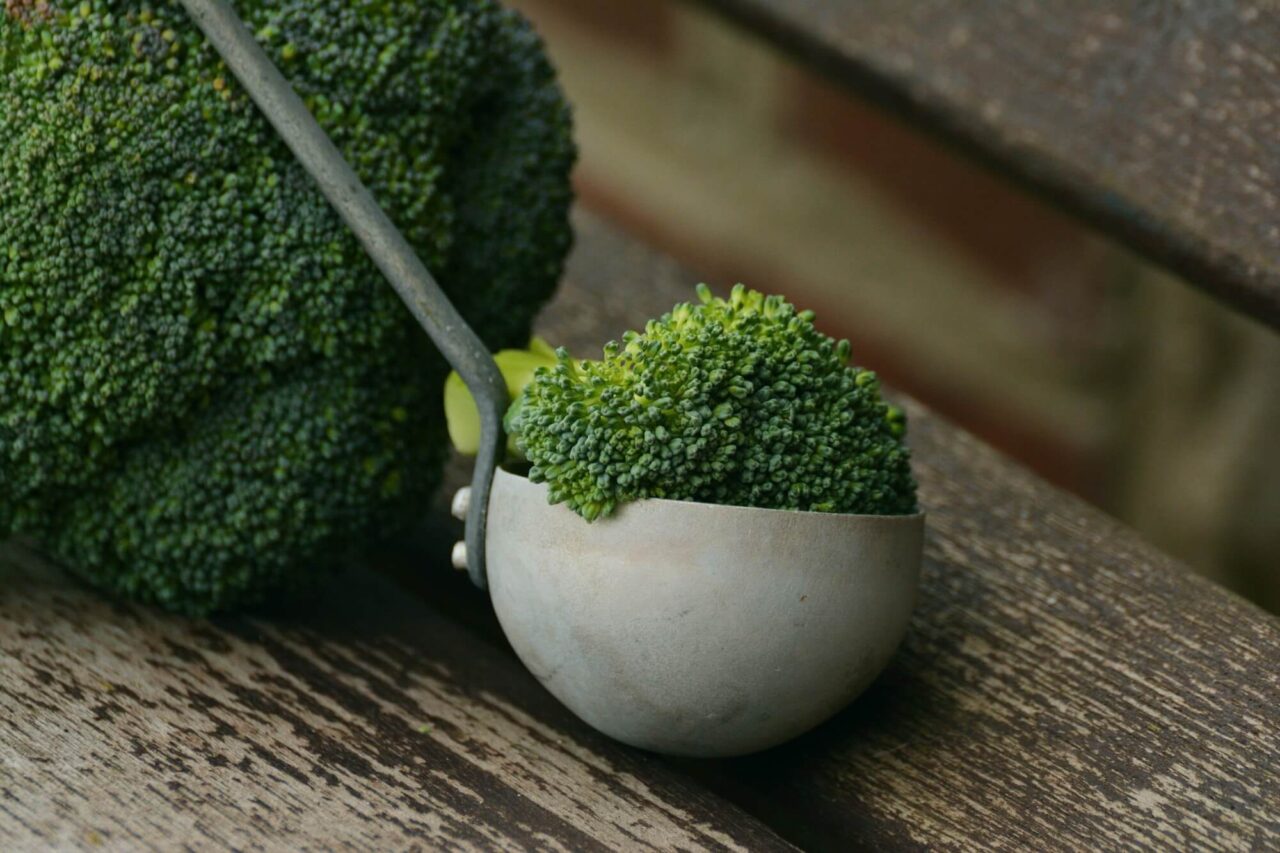
Can Dogs Eat Broccoli?
Yes, dogs can eat broccoli safely and can receive a variety of beneficial nutrients from this vegetable.
Your dog can absolutely enjoy broccoli in all forms, including raw and cooked varieties. You'll just need to be careful not to add any extra seasonings or oils to the pan when you prepare it, as his stomach might not be able to digest those as easily.
Knowing this, you might be tempted to pile his food bowl high with the leafy green good stuff. However, while broccoli is safe for your pup to consume, it's best to exercise portion control.
Why?
Broccoli florets contain small molecules called isothiocyanates. Present on many different kinds of cruciferous vegetables, these can irritate your dog's gastrointestinal tract when consumed in large quantities. Thus, rather than serving him a giant bowl of plain broccoli, mix a little in with his regular dry food for an occasional, tasty topper. Better yet, look for an all-natural dog food that includes vegetables and leafy greens in the ingredients!
Benefits of Broccoli for Dogs
While dogs don't need to consume large amounts of vegetables to live a long and vibrant life, this is one that makes an excellent, healthy snack. Your dog won't just enjoy the taste of broccoli. He'll also reap some pretty amazing health benefits when he chows down, too.
Let's take a look at a few of the benefits of feeding your dog broccoli.
Vitamin K and Bone Density
Research shows that half a cup of broccoli contains 110 mcg of this essential nutrient. Why does this matter?
Vitamin K is directly linked to improvements in bone density. Thus, not only will it help give your family stronger bones, it will strengthen those of your pampered pooch, as well!
This is especially helpful for older dogs who have started to lose bone density and have limited mobility as a result. At the same time, it's also excellent for young dogs who live an active lifestyle and require tough bones to keep up with their daily adventures.
Other dog-safe foods that contain moderate amounts of Vitamin K include cucumbers, celery, and kale. Still, broccoli contains the highest amount of all of these, making it a smart addition to your pup's routine.
Vitamin C and Disease Prevention
Unlike humans, dogs produce Vitamin C naturally. This means that while humans are required to consume a daily dose of Vitamin C to live a healthy lifestyle, dogs don't need it in as high of quantities.
Still, as they get older, dogs tend to have a more difficult time producing an adequate amount of Vitamin C on their own. This is where dark, leafy green vegetables like broccoli can help.
Vitamin C helps aging dogs ward off certain diseases and cancers, helping them feel their best for as long as possible. In the event that the ingested Vitamin C from broccoli is excessive, their bodies will go to work, eliminating any extra amount through their urine.
Other safe fruits that are high in this nutrient include oranges, mangoes, and strawberries!
Potassium and Heart Health Benefits From Broccoli
When you think of human foods that are high in potassium, do bananas come to mind first? While they are rich in nutrients, so is broccoli.
How can this benefit your dog?
Acting as an electrolyte mineral, potassium helps regulate myriad bodily functions that are essential to your health, as well as that of your pup. One of the most important functions is that of your heart rate.
Low levels of potassium have been linked to a condition called arrhythmia, which can cause your heart to beat too quickly, too slowly, or irregularly. This condition can affect both humans and canines, though dogs with shorter snouts (known as brachycephalic breeds), are more susceptible to it, including Boxers, Bulldogs, Pugs, and Shih Tzus. A dog's risk for developing arrhythmia increases with age.
Thus, a small serving of broccoli every once in a while is a great way to help keep your dog's heart healthy as he ages. Yet, keep in mind that it isn't medical treatment for the condition. Your veterinarian will be able to check for signs of arrhythmia and advise you on the proper steps forward.
Looking to supplement his diet with a few more potassium-rich human foods? You'll find excellent concentrations in avocados, and of course, bananas!

Soluble Fiber and Lower Cholesterol
Your dog might look and act fine. Yet, under the surface, he could be developing Hyperlipidemia or high cholesterol. An often-overlooked medical condition, especially in pets, this is one issue that could affect an entire host of bodily systems, as well as your dog's overall quality of life.
Hyperlipidemia occurs when levels of blood lipids (cholesterol) become elevated. When this happens, your risk of developing heart disease increases, along with your likelihood of experiencing a stroke.
Thankfully, broccoli is a proven warrior in the fight against high cholesterol. This is because it contains a high amount of soluble fiber, which serves to extract cholesterol from your body (and your pup's). Consuming it in small quantities can help prevent cholesterol from building up around your arteries over time. Beans, apples, and pineapples are also high in soluble fiber!
Sulforaphane and Reduced Inflammation
Chronic inflammation can create many different kinds of health issues in humans, including:
- DNA damage
- Tissue damage
- Internal scarring
- Certain cancers
- Upper respiratory conditions
At the same time, it's also hard on your furry friend. Especially when it occurs near his digestive system, chronic inflammation can lead to vomiting, diarrhea, weight loss, nutrient deficiencies, reduced appetite, and more. Inflammation can also occur around an aging dog's joints, or on younger breeds that are always on the move.
This can lead to aching joints that make it difficult for your pup to get around. The good news? Broccoli is high in sulforaphane, a sulfur-rich compound that blocks the enzymes responsible for joint erosion. In this way, it acts as an anti-inflammatory, keeping those areas functional and operating as normal.
Broccoli is also high in omega-3 fatty acids, which can help reduce inflammation levels. If your pup suffers from arthritis, you can add a little broccoli to his bowl every now and then to keep his mobility as high as possible.
Risks of Feeding Dogs Broccoli
As mentioned, high quantities of broccoli can have some risks for your dog including be hard on your dog's gut. If you've ever been woken up by a grumbling belly after eating a plate full of green veggies at night, you know that this is also the case for humans!
The real risk occurs when your dog's diet is comprised of more than 25% broccoli. In this case, your pup is consuming excessive amounts of isothiocyanate molecules. In small numbers, they're manageable but they can cause significant health issues or even death if your dog eats an extreme amount of broccoli on a regular basis.
For the most part, however, you're free to feed your dog a little broccoli here and there as a special treat. Normal quantities do not pose this risk and as we've shown, the health benefits far outweigh any negative side effects when it comes to normal consumption.
Just remember to wash the broccoli thoroughly before serving it and try to remove most of the stem to prevent choking.
Begin Feeding Your Dog Broccoli today!
Can dogs eat broccoli? Of course! In fact, it's one of the healthiest and most beneficial treats you can give them.
Are you ready to take a more health-conscious approach to your pup's diet? If so, we're here to make it as easy as possible. Visit our online shop to see what we have to offer. Keep checking in with us to learn more about your dog's health! Seriously, we love talking about it!
Vitamin Supplements for Dogs
Why do dogs need supplements? Age, environment, pollutants, and the stressors of daily life can all lead to less than optimal health for your dog. We’ve created a family of supplements to provide support in the areas your dog needs it most. Learn about Wild Earth's dog supplements.



























